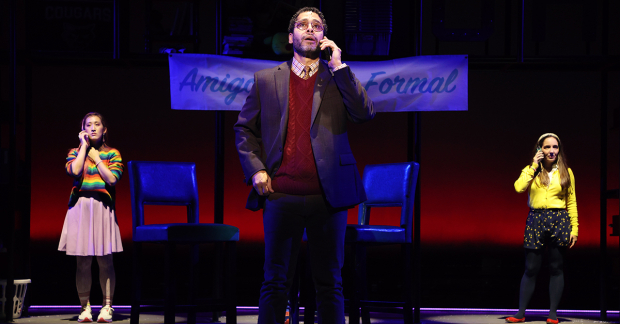Interview: Wilson Jermaine Heredia Learns How to Dance in Ohio
The Tony-winner costars in the new musical at Syracuse Stage.
Wilson Jermaine Heredia transfixed off-Broadway, Broadway, London and the big screen with his multi-award-winning portrayal of Angel in Jonathan Larson's groundbreaking musical Rent.
Now, Heredia is back on the musical stage in another groundbreaking show: Syracuse Stage's world premiere of How to Dance in Ohio. Based on the Peabody Award-winning documentary of the same name, the musical follows seven autistic young adults, all played by neurodiverse actors, as they come of age and find their ways in the world, in part due to the guidance of Heredia's character, Dr. Emilio Amigo.
TheaterMania recently spoke to Heredia about why he wanted this role and putting this new musical together.

(© Curtis Brown)
This interview has condensed and edited for clarity.
How did you get this role, and why did you want it?
It came to me, which is a rare thing; usually, I have to audition. They sent me the tape and I listened to the musical material, and I though this is a really sweet show. What mostly determines whether I want a part is listening to the music. But, yes, there were other factors. First, I have never played a role where I get to play someone who is leading the charge in helping to facilitate the health of others. Second, I heard Hal Prince was originally involved in the project, which definitely piqued my curiosity. And lastly, like Rent, it feels like this show is the first of its kind about this subject matter. I hope the right people see it and bring it to the next level. I dare anyone to leave the show without a smile on their face.
Did you watch the documentary the show is based on?
I saw the documentary two years ago when it was first on HBO. I love documentaries and this one was interesting, but I didn't think more about it. Then I watched it again when I was approached to do this project, and I immediately wondered how this was going to become a musical.
Did you get a chance to talk with Doctor Amigo?
I had a chat with him just prior to the run in Syracuse. I wanted to speak to him so I could give more foundation about who he was. What I got most from him is now a line in the show: "I chose to work with autistic individuals because I know what I was like to stick out I was the color in my community, always trying to fit in, and I want everyone to feel like everyone can fit in." Originally, I did a broader version of him, but after meeting him I made more grounded choices, while adding some theatricality and some of myself. I think it's been a very successful merger. In the end, I think what the onstage character represents is more important than mimicking the actual person. He is the cheerleader, the confident go-getter, and the epitome of optimism.
Tell me about working with the neurodiverse company, and what it's been like for you to join them.
I was worried about me. I was the newcomer here, and I was worried if I could up my game to match them since they had done the show before. Trust me, the "core seven," as we call them, have "it. I love watching their energy every night. More importantly, these actors will absolutely break your preconceptions about what being on the spectrum is expected to be.
Like Doctor Amigo, you have been "the color in your community." Can you talk more about that?
My father is Dominican/Black, my mother is Dominican/white, and going to high school in Brooklyn, a lot of kids thought I was just Black and others thought I didn't understand being Black. There weren't a lot of Dominicans in my school, so I definitely stood out. And then when I was college, I got lucky and could play whatever role I wanted; I did Death of a Salesman, even though I was the only Brown person in the cast. But I never felt more like a person of color in my community than when I began working in the actual theater industry. I discovered there were real limitations to who or what I could play. I felt Brown and happy, but I was also determined to break barriers.








